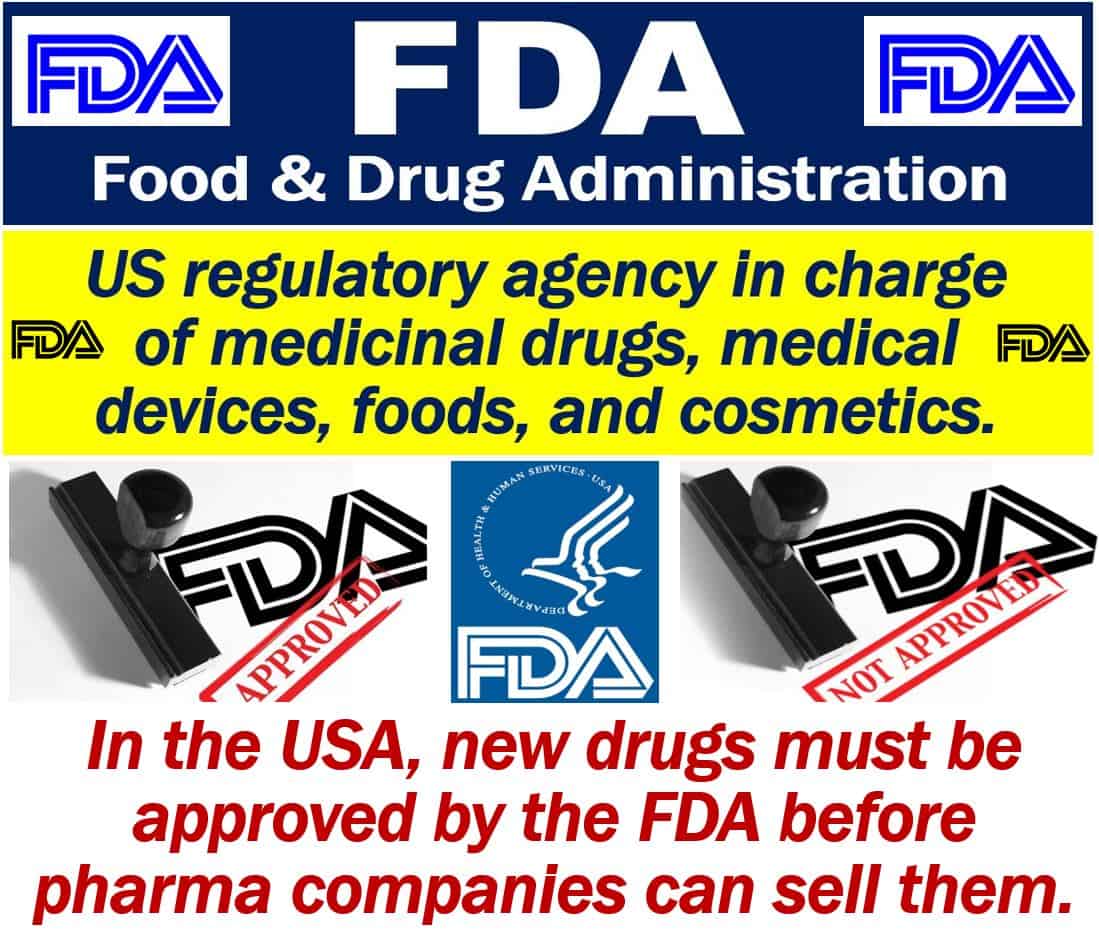The FDA or Food and Drug Administration is the US regulatory agency responsible for foods, cosmetics, and medicinal drugs. It is also responsible for medical devices. Specifically, it is responsible for their safety and efficacy. The agency is responsible for protecting and also promoting public health. We also refer to the agency as the USFDA.
The Commissioner of Food and Drugs is the head of the Food and Drug Administration. The President of the United States appoints the Commissioner with the consent and advice of the Senate.
The Commissioner of Food and Drugs reports to the US Secretary of Health and Human Services.
According to the US Department of Health and Human Services:
“The Food and Drug Administration is responsible for protecting the public health by ensuring the safety, efficacy, and security of human and veterinary drugs, biological products, and medical devices; and by ensuring the safety of our nation’s food supply, cosmetics, and products that emit radiation.”

FDA – tobacco products
All tobacco products are under the purview, i.e., scope of responsibility, of the Food and Drug Administration. It regulates the manufacturing of tobacco products. It also monitors their marketing and distribution.
According to the Agency, its main concern is to protect public health. Another main concern is also to reduce tobacco consumption by minors, i.e., people under the minimum smoking age.
FDA – counter-terrorism
The Food and Drug Administration plays a major role in America’s counter-terrorism capability.
The Agency fulfills its responsibility by making sure that the food supply is safe.
It also fosters the development of medical products to respond to naturally emerging and deliberate health threats. Adding poisoning to the food supply, for example, is seen as terrorism.
List of FDA responsibilities
The FDA is responsible for promoting and protecting public health by supervising and controlling:
- Animal feed and foods. In the English language, ‘feed’ refers to ‘food that we give to animals to eat.’ However, dogs and cat eat ‘food.’
- Biopharmaceuticals, i.e., any drug product that is manufactured in, synthesized from, or extracted from biological sources.
- Blood transfusions.
- Cosmetics.
- Dietary supplements.
- EREDs, i.e., electromagnetic radiation emitting devices.
- Food safety. Any substances that sellers add to foodstuffs, i.e., food additives, must be approved by the Agency.
The agency, along with other agencies such as the CDC, tries to keep the incidence of foodborne illnesses to a minimum. A foodborne illness is one we get because of something we ate.
- Medical devices.
- Pharmaceutical drugs, including OTC, i.e., over-the-counter, and prescription medications. In medicine, OTC refers to drugs you can get without a prescription. In stock trading, OTC refers to trading that two parties carry out directly, rather than on an official exchange.
The FDA also has GLP (good laboratory practice) rules that pharmaceutical companies must follow.
- Tobacco products.
- Vaccines.
- Veterinary products.
FDA – additional information
The FDA has 223 field offices and thirteen laboratories across the United States, Puerto Rico, and the US Virgin Islands. Its headquarters are in White Oak, Maryland.
Since 2008, the Agency has been posting employees to foreign countries, including the United Kingdom, Belgium, India, China, and Chile. It also has employees in Costa Rica.
It has more than eighteen thousand employees and an annual budget of $5.1 billion (2018). The FDA was formed on 30th June 1906.
FDA equivalents in other countries are:
– Australia: TGA or Therapeutic Goods Administration.
– Canada: Health Canada.
– European Union: EMA or European Medicines Agency.
– Ireland: HPRA or Health Products Regulatory Agency.
– New Zealand: MEDSAFE or New Zealand Medicines & Medical Devices Safety Authority.
– UK: MHRA or Medicines & Healthcare Products Regulatory Agency.
